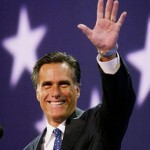A Winning Script for the GOP in 2012
 Everyone is focused on who the next GOP presidential candidate will be. But the more important question is: what will that candidate say to voters?
Everyone is focused on who the next GOP presidential candidate will be. But the more important question is: what will that candidate say to voters?
Everyone is already focused on who the next Republican presidential candidate will be. But as my latest column for The Week points out, the more important question is: what will that candidate say to voters?
By tradition, the next presidential election begins in the weeks after the last congressional election. I'm happily participating in the tradition myself by publicly speculating about possible candidates. But the question facing Republicans for 2012 is not "who." It is "what."
Think of a presidential campaign as a movie. The candidate is the star. The campaign managers are the directors. The finance chairs are the producers. Hair, makeup, wardrobe are important, cinematography essential. But what we need first and foremost — the crucial element that allows everybody else to go to work — is a script. What will the candidate say?
A script does not need to be super-specific: Who knew exactly what Barack Obama meant by hope and change in 2008? Who really understood "compassionate conservatism" in 2000?
But a script does have to meet certain basic tests.
It must be affirmative, not negative.
It must focus on the future, not the past.
It must speak to the concerns of the undecided voter, not the committed partisan.
Let's go to the videotape.
Affirmative not negative: for an example of how not to do it, look at John Kerry's campaign in 2004. He delivered and repeated a fierce critique of George W. Bush's foreign policy. But what would he do instead? Who knew? And the longer voters listened to Kerry, the less they knew.
Future not past: Here's another example of how not to do it, George H.W. Bush's nomination acceptance speech in 1992, which took a victory lap for the fall of the Berlin Wall — then apologized for the "mistake" of agreeing to a budget plan that raised taxes. Yes, it was understandable that a leader who had presided over the tremendous foreign policy successes of 1989, 1990, and 1991 would want some credit for them. But Winston Churchill presided over some foreign policy successes too. When democracies want to say "thank you" for past accomplishments, they build you a statue and pay you millions for your memoirs — but they do not re-elect you.
Concerns of the undecided, not the partisan: See Bob Dole, 1996, campaign of. During Bill Clinton's first term, Republicans became convinced that the Clinton White House seethed with festering corruption. This theme dominated the 1996 campaign. Bob Dole's convention speech in 1996 demanded: "Which is more important, wealth or honor?" He went on to argue that Clinton's success at managing the economy mattered less than "the kind of nation we are." I was in the hall for the Dole speech, and I remember how much the attendees loved it. But the people Dole needed to persuade? They decided that a nation with a booming economy was exactly the kind of nation they wanted to be.
Heading toward 2012, Republicans will be tempted by all three mistakes. How can you avoid negativity when you are seething with rage? How can you address the future when your top priority is to repeal a piece of legislation previously enacted? How can you reach the middle when your primary voters will not tolerate any whiff of compromise?
But those three things must happen for Republicans to win. ...
Click here to read the rest.